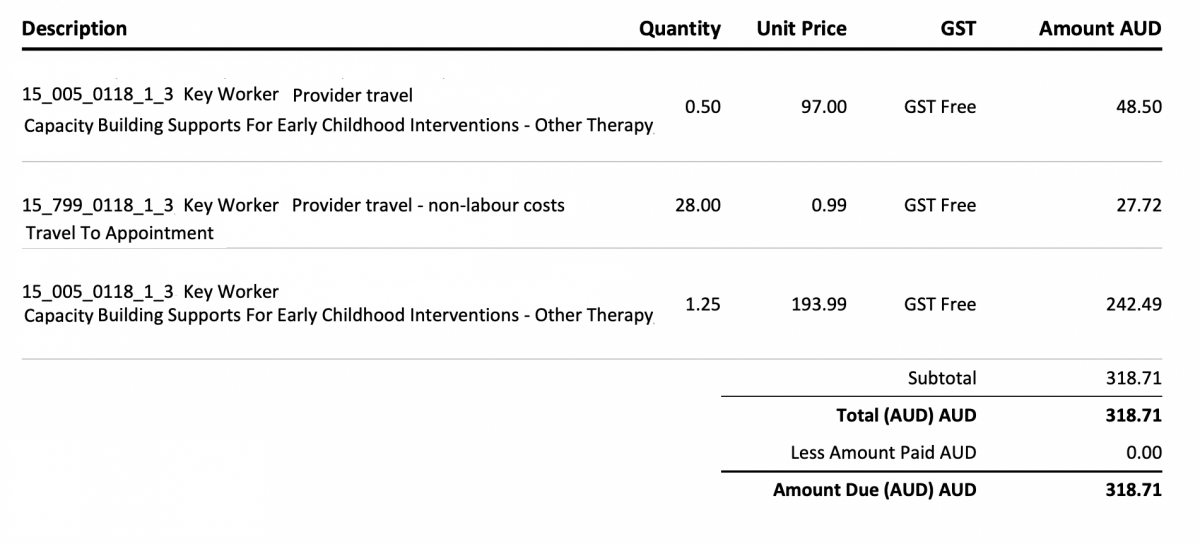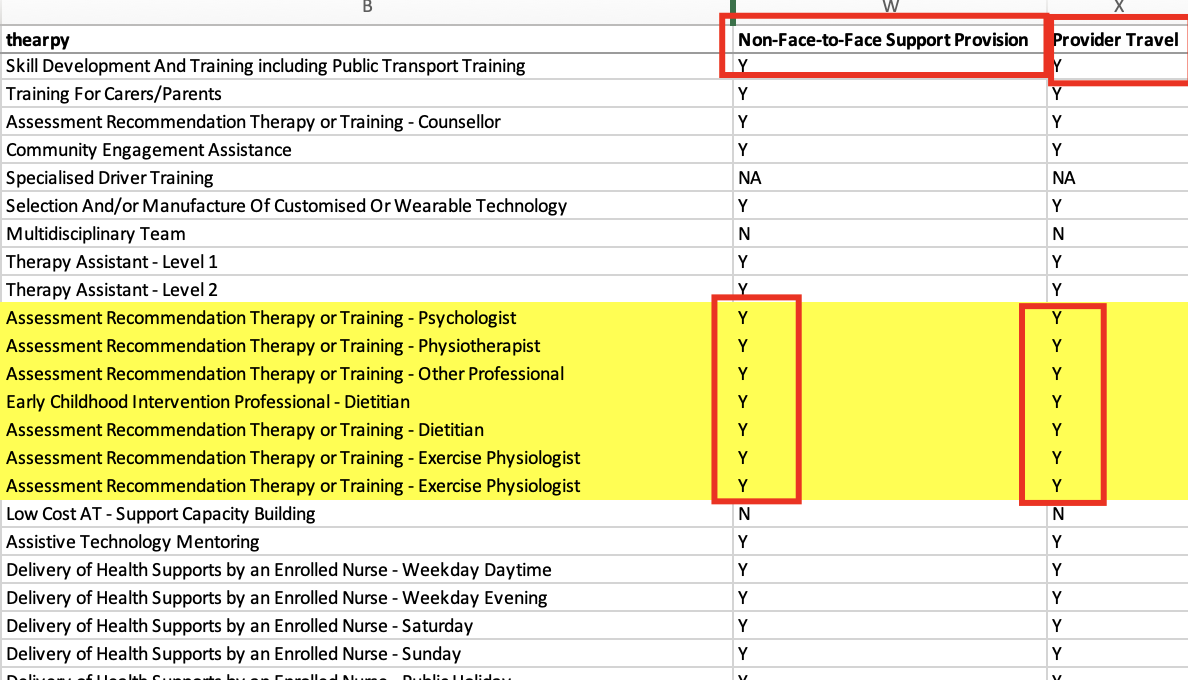
How does the 2025 NDIS Pricing Review affect Therapy Providers
This resource covers;
- What is the NDIS Pricing Review?
- What changes did the NDIS announce about Therapy - effective from 1 July?
- NDIS Therapy Review
- Therapy Prices
- Therapy Travel
- Example of how to calculate Therapy Travel
- What should a Therapy invoice look like - sample therapy invoice
- Changes to Therapy Prices from July 2025
- Changes for Physiotherapists
- Changes for Psychologists
- Changes for Dietitians & Podiatrists
- Which Therapists can charge for travel
- What travel costs Therapists can charge
What is the Annual NDIS Pricing Review
The Annual Pricing Review is when the NDIA looks at how much NDIS services should cost. They check things like:
- Changes in wages
- Increases in prices (inflation)
- What it costs providers to do their jobs
Then, they decide if the maximum prices for NDIS services (like therapy or support work) should go up, down, or stay the same.
This helps make sure:
- People with NDIS plans get good value
- Providers are paid fairly
- The system keeps working well
Now, the NDIA wants to stop doing this big review every year and instead review different services one at a time over a few years. This will make the process more focused and planned.
- NDIA will introduce a 3-year pricing work plan with targeted reviews (not annual full reviews).
- Pricing updates will be released earlier in the financial year to support provider planning.
What therapy changes did the NDIS announce about Therapy - effective from 1 July?
Therapy Review
-
A full review of therapy pricing will be undertaken to assess existing price limits and help guide the move from one-size-fits-all pricing towards the differentiated pricing approach outlined in the Independent Pricing Committee’s report.
-
It will consider factors such as practitioner qualifications, workforce availability, service settings, regulatory obligations, and the nature of participant outcomes achieved.
-
It will be informed by sector consultations and analysis of provider and market data.
-
The review will ensure pricing continues to support participant outcomes, provider sustainability, and service quality.
Therapy Prices
- Price limits will be considered as 10-minute blocks to allow more flexibility. This is intended to encourage greater flexibility in billing and service delivery.
- It aims to clarify that 1 hour is not a ‘default’ or ‘expected’ service length, and that the length of service can vary depending on the agreement between the participant and provider, based on individual needs and circumstances.
Therapy Travel
-
Labour travel claims for therapy will be capped at 50% of the thearpy rate charged by the provider.
-
Non-Labour Costs (with a Participant's agreement via a service agreement) may also be charged at a cost per kilometre* for a vehicle owned by a Provider and
other forms of transport or associated costs up to the full amount, such as road tolls, parking,
public transport fares.
Example of how to calculate Therapy costs
Let’s say a you are a therapist and your participant has agreed to pay travel costs in addition to therapy costs:
- Deliver a 30-minute therapy session
- You travel 35min to get to the Participant
- Your charge rate for therapy is $190/hr
- Your travel rate is 50% of your therapy rate which is $95/hr
- A per km fee of 0.99/km can be charged for other travel related wear and tear. This can be charged in addition to the labour travel fee.
Here's how you calculate the total invoice amount:
- Your therapy rate (labour cost) = 0.5 x $190/hr = therapy cost of $95 (no GST charged)
- Travel time of 30 minutes = 0.5 x travel rate of $95 = travel cost of $47.50 (maximum of 30min can be charged for travel)
- Total amount charged: $142.50 (no GST)
- Note: a non labour travel fee could be included if agreed
Note: Even if you spend 35 minutes traveling, No more than 30 minutes can be claimed. You can only claim $23.75 for travel in this case.
Additional Notes:
- Existing travel time caps remain:
- 30 minutes max in metro areas
- 60 minutes max in remote areas
- Return travel can only be charged if returning to your usual place of business.
What should a Therapy invoice look like?
Each line item should include:
-
Description: This should include a description and th NDIS support line item code
-
Quantity of units
-
Cost per unit
-
Amount (quantity x cost per unit)
Here is a sample of a correct therapy invoice:

2025 Changes to Therapy prices
The NDIS has told us that their review used over 10 million+ therapy data transactions, benchmarked against Medicare, PHI, and other schemes—revealing some NDIS prices exceeded market rates by up to 68%.
These changes focus on keeping travel costs proportionate to the length of the actual service provided.
Physiotherapists
- The NDIA plan to remove the state and territory differentiated pricing arrangement for supports delivered by a Physiotherapists.
- A national price of $183.99/hr will replace state-based pricing.
- This will result in a reduction in price limit of $10/hr for Physiotherapists in NSW, VIC, QLD and ACT.
- This will result in a reduction in price limit of $40.06/hr for Physiotherapists in WA, SA, NT and TAS.
Psychologists
- The NDIA plan to remove the state and territory differentiated pricing arrangement for supports delivered by Psychologists.
- A national price of $232.99/hr will apply.
- This will result in a reduction in price limit of $11.23 for Psychologists in WA, SA, NT, and TAS.
Dietitians & Podiatrists
- National prices will decrease by $5 to $188.99/hr.
Which Therapy Providers can charge for travel?
Capacity Building Providers (fancy name for therapists in NDIS speak) if there is a 'Y' in the 'Provider Travel' column in the NDIS Support Catalogue for the service line item.

What Travel Costs can Therapists Charge For?
Therapists offering services in the NDIS can charge for the following travel costs:
1. Labour Costs (your time)
This is the time you spend:
- travelling to your client and
- returning to your usual place of business afterwards
- time spent doing administrative tasks like report writing and research
(NOTE: this can only be charged if the support catalogue has a 'Y' in the 'Non-Face-to-Face Support Provision' column)
2. Non-Labour Costs
With a Participant's agreement (via a service agreement) a therapist may also charge a client for a portion of your non-labour travel costs.
This travel cost could include:
- a cost per kilometre* for a vehicle owned by a Provider and
- other forms of transport or associated costs up to the full amount, such as road tolls, parking,
- public transport fares.
The NDIS has set a maximum rate of $0.99 per km. You will need to negotiate an amount with your client.
*Check the NDIS Pricing Arrangements and Price Limits document for the latest rates.
Find your MMM region by entering your address here
NDIS THERAPY FINDER - FREE SERVICE
LET US FIND YOU A SKILLED SUPPORT WORKER

